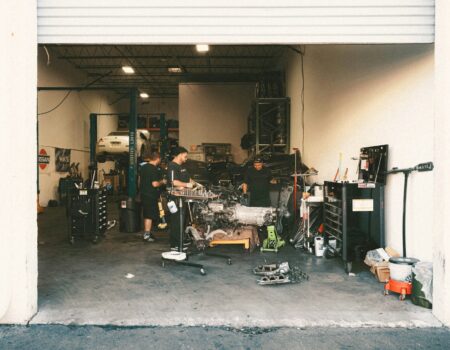Selecting the right equipment for lawn care, DIY projects, or small-scale construction comes down to one major decision—which type of small engine should you choose? Understanding the differences between electric and gas engines will help you make a confident equipment choice, ensuring you get the performance and efficiency you need. This post compares electric vs gas engines for small applications and covers essential factors including power, maintenance, cost, and environmental impact. If you’re looking to learn more about engine types before your next purchase, you’re in the right place.
Weighing Your Options for Power and Performance
Electric Engines Offer Consistent, Instant Torque
Electric small engines provide steady performance from start to finish. With instant torque delivery, an electric leaf blower or lawn mower starts at full power and maintains that energy until the battery is depleted. This is ideal for users seeking reliable, predictable operation and quick startups. New technology ensures battery life continues to improve, making electric options more viable for longer sessions.
Gas Engines Excel at Raw Power and Endurance
For those who need to tackle larger properties or dense foliage, gas-powered small engines deliver superior output and runtime. Their combustion engines generate more horsepower and handle thick grass or heavy debris without bogging down. Refueling takes minutes and eliminates delays due to battery charging, suiting contractors and homeowners needing power over extended periods.
Maintenance Matters for Every Owner
Electric Engines Keep Care Simple
Simplicity is one of the key advantages of electric engine types. There are no oil changes, spark plug swaps, or fuel stabilizers needed. Most electric tools require only basic cleaning and the occasional battery check. This low-maintenance approach appeals to busy users or anyone new to engine care who wants to avoid time-consuming upkeep.
Gas Engines Require Regular Attention
Gas-powered equipment involves a more hands-on maintenance routine. Regular oil changes, air filter replacements, and periodic inspections are essential for reliability and longevity. Winterizing gas engines, using the right fuel mix, and keeping all engine components in shape add to the time investment. For those comfortable with a bit of DIY, however, these tasks may not pose an issue.
Comparing Environmental Impact
Electric Engines Offer Clean Operation
A major appeal of electric small engines is their clean operation. There are zero direct emissions and less noise, leading to a smaller carbon footprint. For users aiming to reduce their environmental impact or comply with new regulations around emissions, electric tools provide peace of mind and quieter operation for neighborhoods.
Gas Engines Produce More Pollution
While gas engines have been the industry standard for decades, they emit exhaust gases and contribute to air pollution. Stricter environmental standards in some areas now limit or ban gas-powered equipment. However, innovations such as cleaner-burning fuels and improved engine designs are reducing their impact, though not to the same degree as electric alternatives.
Exploring Costs and Long-Term Value
Upfront Price Versus Long-Term Savings
Gas-powered small engines generally have a lower sticker price, but the cost of fuel, oil, and upkeep can add up over time. Electric equipment may have a higher initial cost due to the battery and charger, but running costs are lower. You’ll save on gasoline, and batteries typically last years with proper care. Consider your usage frequency and maintenance willingness to calculate the true value.
Factoring in Availability and Model Choices
Electric-powered lawnmowers, chainsaws, and trimmers are rapidly gaining popularity, but gas-powered models still offer the widest variety and options for specialized needs. Whether you need a high-torque string trimmer or a rugged snow blower, gas engines cover nearly every application. Electric options are catching up and now include models for most common residential tasks.
Examining Portability and Ease of Use
Battery Power Offers Cord-Free Freedom
Electric engines, especially those running on lithium-ion batteries, provide great mobility without the hassle of extension cords or the fumes of gas units. Lightweight battery packs make electric models more comfortable to handle, and there’s no need to haul fuel during use.
Gas-Powered Units Handle Demanding Jobs
When working far from outlets or over large areas, gas equipment has the range for bigger jobs. Refillable tanks ensure you won’t be stalled in the middle of a project, and most gas models have ergonomic designs to reduce fatigue during long sessions. However, the overall weight is often higher than comparable electric models, so consider your physical comfort and job demands.
Noise Levels and Local Restrictions
Quieter Work with Electric Equipment
One of the most underrated benefits of electric engines is quiet operation. Homeowners in residential neighborhoods appreciate the reduced noise, making early morning or late evening yard work possible without disturbing others. Some areas even require quieter tools under local ordinances, giving electric equipment an edge.
Gas Engines Can Mean More Disruption
Gas engines are known for their characteristic roar, which some users find motivating but others may consider disruptive. This is an important point if you’re working in noise-sensitive environments or want to comply with local restrictions.
Making an Equipment Choice That Fits You
Whether electric or gas engines are best for you depends on your specific needs, property size, and how you weigh the balance between convenience, power, and environmental considerations. Improving battery tech and growing electric model options make them an increasingly attractive equipment choice for homeowners who want quiet, clean, and low-maintenance solutions. Meanwhile, gas engines maintain their place among professionals and users who demand endurance and top-tier power, especially for heavy-duty or remote projects.
Final Considerations for Engine Types
You’ve explored a detailed small engine comparison across all essential factors. The ideal equipment choice often comes down to your priorities and intended use. If convenience, noise reduction, and simple upkeep are at the top of your list, electric engines are likely a strong fit. For those who need maximum power and routine all-day use, gas engines remain hard to beat.
Take a careful look at your property, task scope, and comfort level with maintenance. The right choice ensures your equipment will serve you well for years to come. If you want to learn more about engine types and the latest lawn equipment innovations, consult manufacturer guides or visit trusted retail experts for tailored advice.







